Cybersecurity is one of the most rapidly growing fields today, with organizations across the globe placing a high priority on protecting their data, systems, and networks from cyber threats. As the digital world evolves, the demand for skilled cybersecurity professionals has skyrocketed. This blog will walk you through the essentials of cybersecurity certifications for beginners, including an introduction to the field, why certifications matter, and a rundown of the best certifications to get started with.
What is Cyber Security?
Cybersecurity, at its core, involves the practices and technologies used to protect digital assets from unauthorized access, theft, or damage. As businesses and individuals continue to depend on technology for nearly every aspect of daily life, cybersecurity has become a fundamental part of safeguarding data.
Related Blog: Top Cyber Security Certifications
Importance of Cyber Security
The increasing frequency and complexity of cyberattacks make cybersecurity a crucial consideration. Threats such as data breaches, hacking, phishing, and ransomware attacks are just a few examples of the types of dangers that cybersecurity professionals strive to mitigate.
In the digital age, where sensitive information—ranging from personal data to intellectual property—is stored and transmitted online, it’s no surprise that cybersecurity is a priority for both private and public organizations. Cybersecurity ensures that users, systems, and networks remain safe and that business operations continue without disruption.
Related Blog: Benefits of Cyber Security Certifications
Why Entry-Level Certifications Matter
Cybersecurity can seem like a highly specialized field, and breaking into it may feel overwhelming. One of the best ways for beginners to make themselves stand out in this competitive industry is by earning entry-level cybersecurity certifications. Here’s why they matter:
Validation of Skills
Cybersecurity certifications are a way to validate your skills, knowledge, and understanding of core security concepts. These certifications demonstrate your ability to tackle common cybersecurity challenges and help employers see that you are a capable candidate for entry-level positions.
Improved Job Prospects
For beginners, certifications can be the key to landing your first job in the field. Many organizations require at least one foundational certification before considering applicants for cybersecurity roles. Having certifications on your resume shows potential employers that you have the fundamental skills needed for the job.
Hands-on Experience
Beyond theoretical knowledge, most certifications require practical, hands-on learning. This is crucial in the cybersecurity field, where applying what you’ve learned in real-world scenarios is essential. Certifications often include labs, practice exams, and simulated environments to help you build your practical skills.
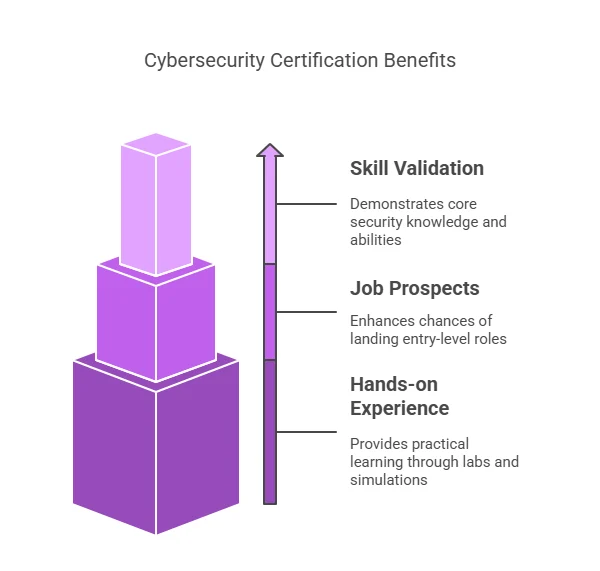
Recommended Certifications for Beginners
For those just starting their journey in cybersecurity, there are several well-established certifications that can help you gain the foundational knowledge and hands-on experience needed. Here are three of the most widely recognized entry-level cybersecurity certifications:
CompTIA Security+
Overview: CompTIA Security+ is one of the most popular entry-level cybersecurity certifications. It covers a wide range of topics, including network security, cryptography, risk management, and threat analysis.
Why It’s Recommended:
- It’s widely recognized in the cybersecurity industry.
- The exam covers essential topics, making it a great starting point.
- CompTIA is known for its vendor-neutral approach, meaning the certification isn’t tied to a specific company’s products.
Prerequisites: While no formal prerequisites are required, it’s recommended to have a basic understanding of networking and IT fundamentals (CompTIA Network+ is a great pre-cursor to Security+).
Related Blog: Cyber Security Certifications for Beginners
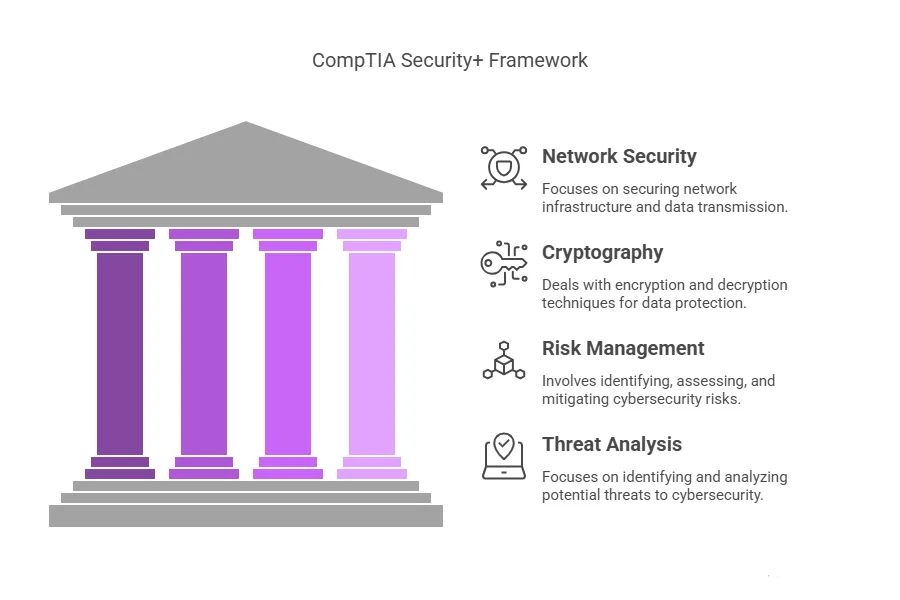
Certified Ethical Hacker (CEH) – Entry Level
Overview: The CEH certification is offered by EC-Council and focuses on ethical hacking techniques. The entry-level version is suitable for those who want to learn how to think like a hacker in order to better defend against cyberattacks.
Why It’s Recommended:
- The CEH certification is highly respected in the industry.
- It teaches skills related to penetration testing, which is a key aspect of modern cybersecurity defense.
- It prepares candidates to identify vulnerabilities and weaknesses in computer systems.
Prerequisites: At least two years of work experience in the Information Security domain or completion of an EC-Council training program.
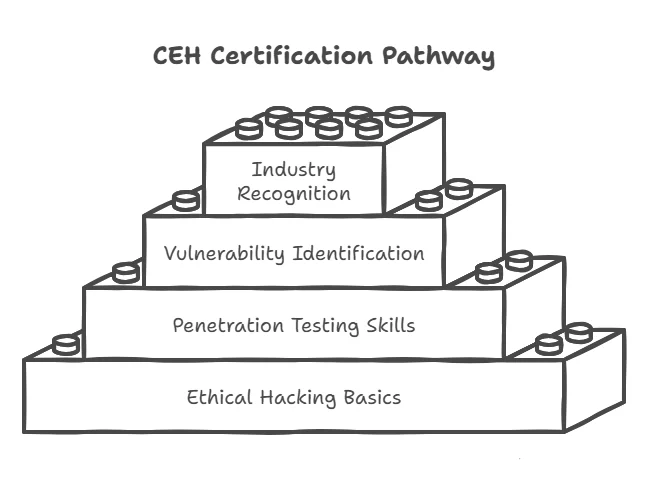
Cisco Certified Network Associate (CCNA) Security
Overview: The CCNA Security certification from Cisco focuses on the basics of network security. The certification teaches you to secure Cisco networks and understand the types of security threats targeting modern businesses.
Why It’s Recommended:
- Cisco certifications are known for their credibility and industry recognition.
- CCNA Security is ideal for those who are specifically interested in network security.
- It prepares candidates for real-world scenarios involving network security implementation and management.
Prerequisites: Candidates should have basic knowledge of networking. A CompTIA Network+ certification is recommended before pursuing the CCNA.
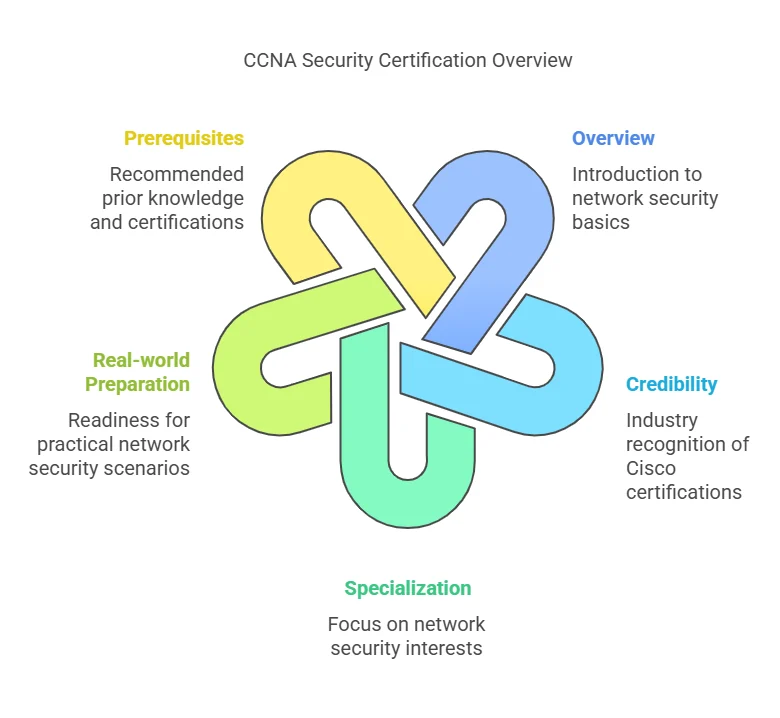
Prerequisites and Preparation
Before diving into certification exams, it’s important to understand the preparation required for each certification. Here’s a breakdown of prerequisites and preparation resources for each certification mentioned above:
CompTIA Security+
- Prerequisites: No formal prerequisites, though having a basic understanding of networking and IT will help.
- Preparation:
- Books: “CompTIA Security+ Study Guide” by Mike Meyers and the “CompTIA Security+ All-in-One Exam Guide” by Shon Harris are both excellent resources.
- Online Courses: Platforms like Udemy, Coursera, and LinkedIn Learning offer Security+ preparation courses, often featuring video tutorials and practice tests.
Certified Ethical Hacker (CEH) – Entry Level
- Prerequisites: At least two years of work experience in a related field, or completion of an EC-Council-approved training program.
- Preparation:
- Books: “CEH v11 Certified Ethical Hacker Study Guide” is a comprehensive guide.
- Online Training: EC-Council offers a variety of resources, including official training courses, and there are various online platforms offering practice exams.
CCNA Security
- Prerequisites: Basic networking knowledge is recommended (CompTIA Network+).
- Preparation:
- Books: “CCNA Security Study Guide” by Todd Lammle is widely regarded as the go-to resource.
- Online Courses: Cisco provides official online courses, and platforms like Pluralsight and Udemy have specific courses designed to help you pass the exam.
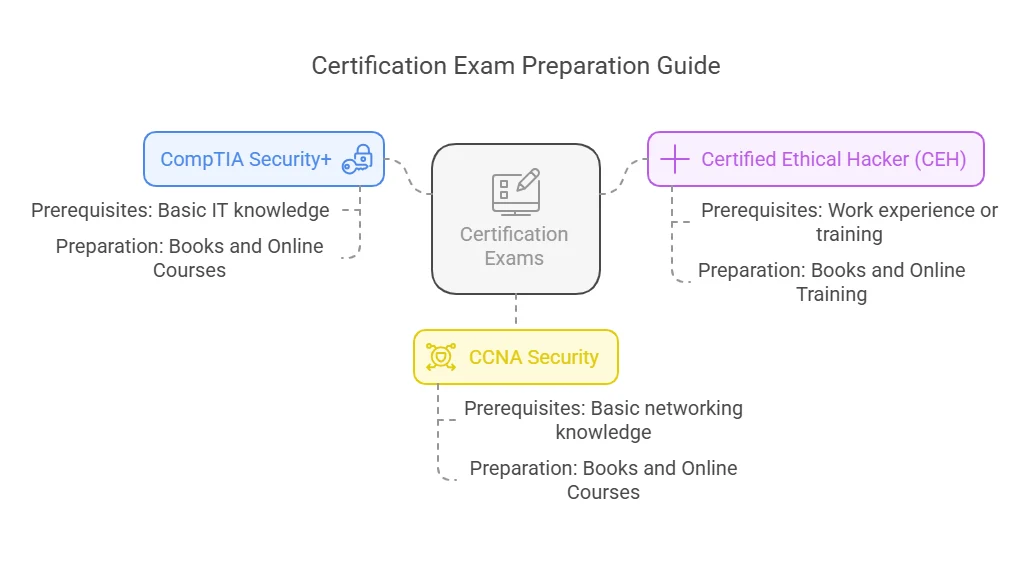
Costs and Duration
The cost and duration of obtaining cybersecurity certifications can vary depending on the certification and how you choose to prepare.
CompTIA Security+
- Cost: Exam costs around $370.
- Duration: Study time ranges from 3 to 6 months, depending on the amount of time you dedicate each week.
Certified Ethical Hacker (CEH) – Entry Level
- Cost: The exam costs around $1,199. However, the required training courses can add to the total cost.
- Duration: Most candidates take 4 to 6 months to prepare for the CEH certification.
CCNA Security
- Cost: The exam costs around $300.
- Duration: The average study time is 3 to 6 months, depending on prior knowledge.
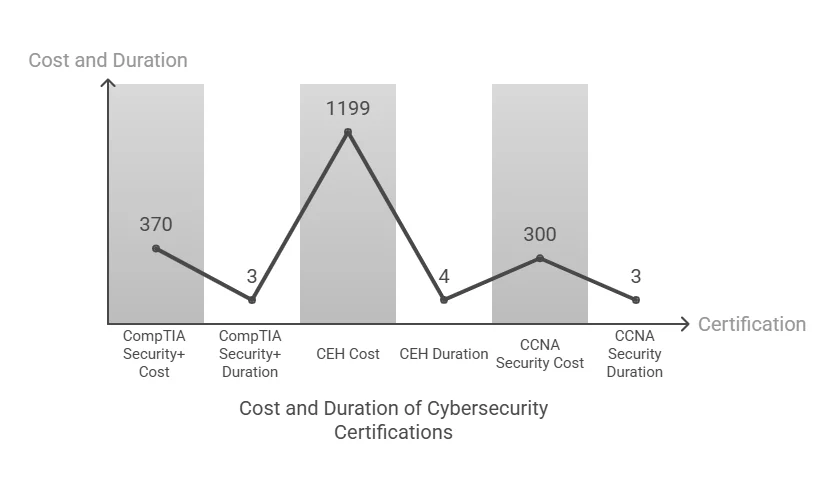
Job Roles for Beginners
After obtaining your cybersecurity certifications, you can apply for various entry-level roles in the industry. Here are some common job roles that you can expect to pursue after earning one of these certifications:
Security Analyst
Security analysts monitor and protect an organization’s computer systems and networks from cyberattacks. They analyze security measures, respond to incidents, and ensure that systems remain secure.
Network Administrator
Network administrators manage and secure an organization’s network infrastructure. They install, configure, and maintain networking hardware and software, ensuring network availability and reliability.
IT Support Specialist
IT support specialists help organizations maintain their information systems. In cybersecurity, they assist with the installation, troubleshooting, and maintenance of security software, firewalls, and antivirus programs.
Conclusion
In the digital age, cybersecurity certifications are an essential stepping stone for those starting their careers in the cybersecurity industry. Entry-level certifications such as CompTIA Security+, Certified Ethical Hacker, and Cisco CCNA Security provide the foundational knowledge and skills needed to protect organizations from cyber threats.
These certifications not only help you acquire practical, hands-on experience but also make you a more competitive candidate in the cybersecurity job market. As you advance in your career, you can continue building your expertise with more advanced certifications.
At ACSMI, we understand the importance of continuous learning and offer a variety of certifications to help you on your cybersecurity journey. Our comprehensive programs are designed to help you stay up-to-date with the latest trends and technologies in the cybersecurity field.
FAQs
Do I need a degree to get started in cybersecurity?
No, while a degree can be beneficial, certifications are often more important for getting started in cybersecurity. Many entry-level positions require specific certifications rather than a degree.
How long does it take to earn a CompTIA Security+ certification?
On average, it takes 3 to 6 months to prepare for the CompTIA Security+ exam, depending on your background and study schedule.
What is the difference between the CEH and CompTIA Security+ certification?
The CEH focuses more on ethical hacking and penetration testing, while CompTIA Security+ provides a broad overview of network security and risk management.
Are there any free resources to help me prepare for these certifications?
Yes, many free resources are available, including practice exams, video tutorials, and forums. Websites like Cybrary and YouTube offer free cybersecurity courses.
Can I switch from an IT support role to a cybersecurity role with just these certifications?
Yes, many people successfully transition from IT support to cybersecurity roles with foundational certifications. The skills are transferable, and certifications can give you the necessary knowledge to make the switch.

Leave a Reply